
Template: Project Quality Plan; Programme Quality Plan
Quality is one of the 9 topic areas of project management knowledge.
A quality plan sets the expected quality standard and gives indication of the modalities for ensuring that these standards are achieved.
The program Quality Plan is a document produced by the programme manager or by the programme management team defining all relevant standards and procedures to use to ensure that work is completed successfully to the required level of quality.
A project quality plan should conform to the programme quality plan and guidelines.
What is "quality" in development/humanitarian programmes and how can we set the "standards"?
“Quality” in programmes refers to the minimum standards that managers and teams must maintain in what and how they do programmes and the impact, effectiveness, efficiency, sustainability, accountability and transparency of outputs and processes achieved in all phases of programming and in all sectors of programme implementation.
These standards are expressed in mandatory procedures, communication and planning systems of the organisation and/or donors, national laws, stakeholder requests, etc.
Besides focusing on project performance, quality issues revolve around the team’s ways of working and relationships between the various players in the region, including areas such as performance management, fundraising, resource allocation, project management, budgeting, spending, human resources, organisational decision-making and programme support.
A good programme design will consider how to monitor and evaluate during and after the implementation phase (in itinere and ex post). It will therefore decide what are the indicators and what are the sources of information for judging the efficiency, the effectiveness and the impact. Information sources may be independent from the programme/project management team and the organization. Others will be the internal evaluation tasks that will collect data concerning processes and outcomes. (see some Impact level indicators) see Project Integration and Support
Programme designers will consider the standard methods of collecting and analyzing data and will adopt those that are seen as most suitable. Eventually a new approach may be proposed. After deciding on the method there will be an illustration of the evaluation activity within the program/project, including the indications regarding how to use the monitoring/evaluation results for improved programme/project management for organization development and for employee empowerment and learning. (see evaluation reporting methods; and methods for generating acceptance for the evaluation reports). The elements of an evaluation action are illustrated in the chapter on program evaluation.
An evaluation based programme cycle management, is the key factor of programme quality. In fact in order to ensure program quality programme managers need to use the feed back of monitoring and evaluation in order to check whether the programme or project is being implemented according to plan; assess whether the programme of project is resulting in the changes or impacts we anticipated; consider how sustainable the programme or project impact is likely to be; consider how successfully the programme or project is addressing or having an impact on gender issues; identify key learning and action points to feed back into this programme or project and inform future projects, programmes and policy. (see also Quality Assessment of Evaluation Reports )
The participatory approach to all aspects of the programme cycle management will ensure at the same time high quality operational standards, transparency and accountability.
A good programme will
strengthen the advocacy component in the country programme for example in women’s rights and gender equity, water and sanitation and public health, etc.
Basic principles of programme quality in aid organizations are:
The programme is managed within the value system of the organizational culture
Programs are designed and implemented following all the stages of the programme cycle
Projects are conceived and managed within the programs frameworks
Programmes are constantly evaluated and the feed back of evaluation gives indication for improved programming as well as for organizational development
See also in the project implementation phase: Implement Quality Assurance and Quality Control Processes according to the Quality Standards Revised During Project Planning
A good programme design will give answers to the following questions:
What is the cultural and policy approach that is
expected to be used in the implementation methodology
-
How shall we have an impact?
What is the expected quality standard and how to achieve it?
How will the project or programme be monitored, evaluated and
its impact measured?
-
How do we
Evaluate Programmes?
How will the organization learn from the programme?
-
Integrating learning in the Programme Cycle Management
How are cross-sectoral issues of development considered in the
programme?
-
Integrating Gender issues into
Programme Cycle Management
-
Integrating
HIV/AIDS issues into Programme
Cycle Management
-
Participatory Approach and Transparency to Development Actions and Policies
<
Achieving professional reputation through the application of high standards in all aspects of organizational culture and management style is a fundamental requirement for generating an organizational image that is a prerequisite for a successful partnership management.
See also
How can we manage collaborations so as to achieve high reputation?
The ability to support and understand the many different contexts/cultures in the developing world
Other resources:
See also: Managing CSSQ
-----------
Spider diagram of organizational capacity

Templates:
Project Quality Plan; Programme Quality Plan
Quality Management Plan,
Quality Metrics,
Quality baseline